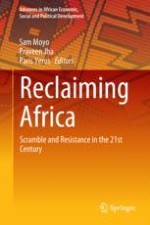2019 | OriginalPaper | Chapter
Land-Based Investments in Tanzania: Legal Framework and Realities on the Ground
Authors : Godfrey Eliseus Massay, Telemu Kassile
Published in: Reclaiming Africa
Publisher: Springer Singapore
Activate our intelligent search to find suitable subject content or patents.
Select sections of text to find matching patents with Artificial Intelligence. powered by
Select sections of text to find additional relevant content using AI-assisted search. powered by
